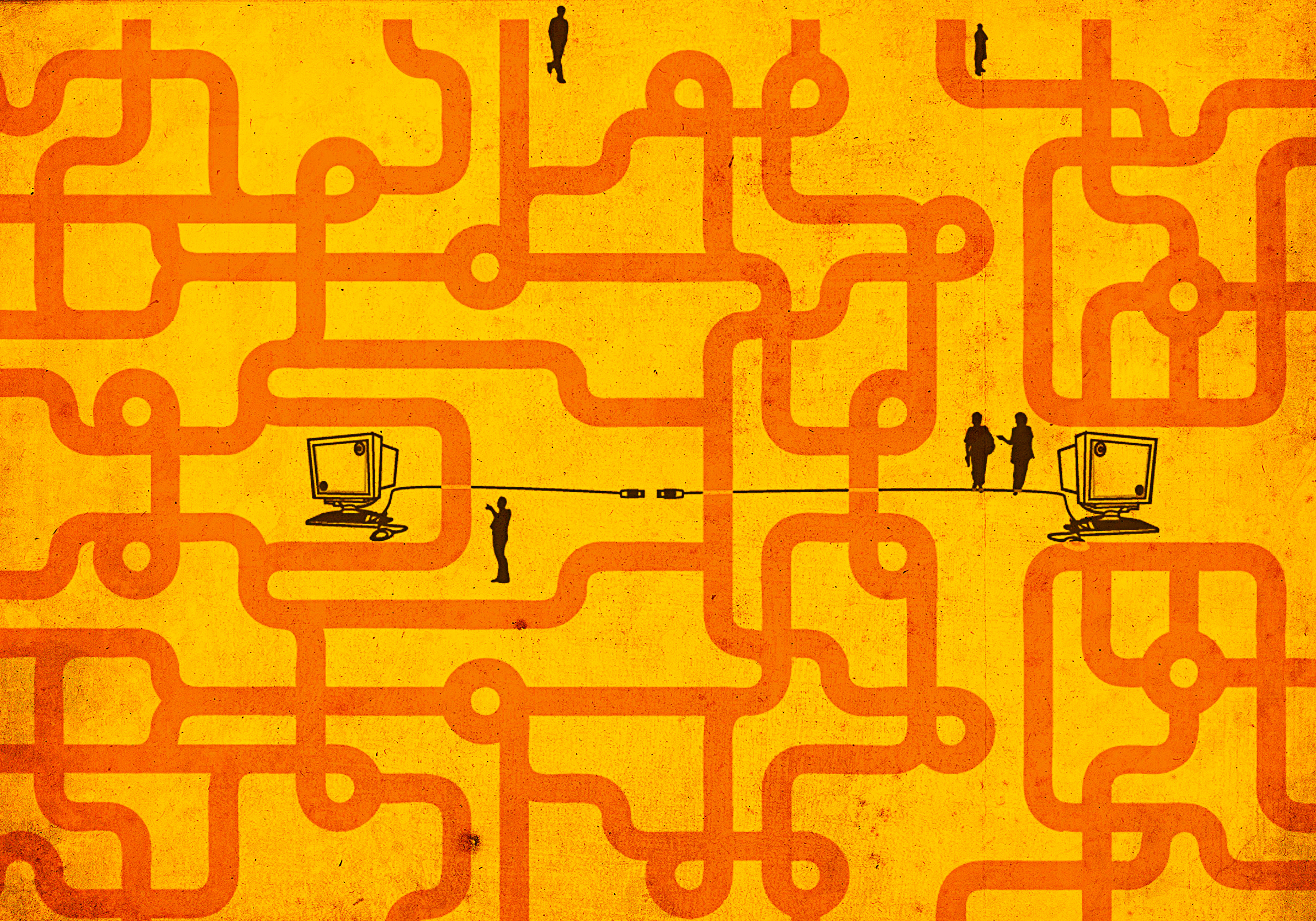This is why the GOP will never pass a decent infrastructure bill
A recent FCC decision is a sign of things to come


A free daily email with the biggest news stories of the day – and the best features from TheWeek.com
You are now subscribed
Your newsletter sign-up was successful
The Federal Communications Commission recently decided to roll back internet subsidies for poor households. The nuts and bolts of what happened are a little complicated. But it helps illustrate why President Trump is going to have a hard time living up to his promises to revitalize America's infrastructure.
At issue is a program called Lifeline, which has provided low-income Americans a subsidy to buy mobile services for over 30 years. Back in March 2016, the FCC decided to expand Lifeline to apply to purchases of internet and mobile broadband services. The three Democratic and two Republican commissioners who made up the FCC at the time were working on a compromise decision that would've put a $1.75 billion annual budget cap on the program. But the deal fell apart, and the FCC approved the program with a higher annual cap of $2.25 billion on a 3-to-2 partisan vote.
This apparently created a lot of bad blood.
The Week
Escape your echo chamber. Get the facts behind the news, plus analysis from multiple perspectives.

Sign up for The Week's Free Newsletters
From our morning news briefing to a weekly Good News Newsletter, get the best of The Week delivered directly to your inbox.
From our morning news briefing to a weekly Good News Newsletter, get the best of The Week delivered directly to your inbox.
Mignon Clyburn, one of the Democrats, says she concluded the cap was just too low. But Ajit Pai, one of the Republican commissioners, apparently believed Clyburn had been strong-armed by the FCC's Democratic chair — and felt burned by the whole affair.
Fast forward to December and January. The FCC approved nine new internet providers under the new program — the first to get the green light since the March decision, and the first to be approved nationwide. But then the Obama administration departed and the FCC's Democratic chair departed with them. Trump named Pai as the new acting FCC chair, and now the FCC has a two-to-one Republican majority with two seats vacant.
On Friday, Pai scuttled the approval of those nine companies, calling it a "midnight regulation" jammed through at the last minute. The FCC also indicated that further rollbacks might be coming for the nascent internet subsidies program. Cancelling those nine companies "would promote program integrity by providing the [FCC] with additional time to consider measures that might be necessary to prevent further waste, fraud, and abuse in the Lifeline program," the FCC said in Friday's decision.
Now, none of the nine providers have been accused of any fraud. And the FCC already established a third-party verifier to make sure the providers don't sign up ineligible customers, so it's not clear where the waste or abuse is coming from either.
A free daily email with the biggest news stories of the day – and the best features from TheWeek.com
In fact, "waste, fraud, and abuse" is really just a Republican boilerplate justification for spending cuts. And that's the core disagreement here: spending.
When Pai was introduced as the new FCC chair, he talked a big game about how closing the divide in internet access should be one of the FCC's "core priorities." But when push comes to shove, he and other Republicans are just not going to increase government spending to fund what basically amounts to a small infrastructure project.
And that's really what internet access amounts to now. Like roads, bridges, electric grids, or railways, the internet isn't just part of the economy anymore — it allows you to participate in all of the other parts of the economy. These days, if you don't have regular and reliable access to the internet, you're less useful to many employers and you lose out on a host of job opportunities. The internet is also an important educational tool for young people, yet about five million American households with school-age children can't afford it.
But unlike most bridges and roads, the internet is not provided as a public good by the government. It's a for-profit service sold by private corporations. And so private companies set up high-speed broadband and the like for the customers that can afford it, while the ones who can't — the ones who need it most — are left in the lurch. The Lifeline expansion hoped to solve this dilemma by giving poorer households cash to pay for the service, so they would become a more attractive customer base. But now it's basically dead on arrival.
Given everything else happening in Washington, D.C., this may not seem like a big deal, but it's really the GOP's infrastructure plan writ small.
Trump may have pledged on the campaign to invest as much as $1 trillion in infrastructure, but he and other Republicans are already finding predictable ways to weasel their way of that promise. In fact, the GOP seems to be coalescing around an infrastructure bill that will use corporate tax credits instead of public spending to entice private companies into building more. That's basically going to mean beautiful new toll roads for wealthy drivers and crumbling byways for everyone else.
Given that 60 percent of Americans say Trump's infrastructure promises are the ones he most needs to keep, this could be a big problem for the GOP.
Jeff Spross was the economics and business correspondent at TheWeek.com. He was previously a reporter at ThinkProgress.
-
 Heated Rivalry, Bridgerton and why sex still sells on TV
Heated Rivalry, Bridgerton and why sex still sells on TVTalking Point Gen Z – often stereotyped as prudish and puritanical – are attracted to authenticity
-
 Sean Bean brings ‘charisma’ and warmth to Get Birding
Sean Bean brings ‘charisma’ and warmth to Get BirdingThe Week Recommends Surprise new host of RSPB’s birdwatching podcast is a hit
-
 Film reviews: ‘Send Help’ and ‘Private Life’
Film reviews: ‘Send Help’ and ‘Private Life’Feature An office doormat is stranded alone with her awful boss and a frazzled therapist turns amateur murder investigator
-
 The billionaires’ wealth tax: a catastrophe for California?
The billionaires’ wealth tax: a catastrophe for California?Talking Point Peter Thiel and Larry Page preparing to change state residency
-
 Bari Weiss’ ‘60 Minutes’ scandal is about more than one report
Bari Weiss’ ‘60 Minutes’ scandal is about more than one reportIN THE SPOTLIGHT By blocking an approved segment on a controversial prison holding US deportees in El Salvador, the editor-in-chief of CBS News has become the main story
-
 Has Zohran Mamdani shown the Democrats how to win again?
Has Zohran Mamdani shown the Democrats how to win again?Today’s Big Question New York City mayoral election touted as victory for left-wing populists but moderate centrist wins elsewhere present more complex path for Democratic Party
-
 Millions turn out for anti-Trump ‘No Kings’ rallies
Millions turn out for anti-Trump ‘No Kings’ ralliesSpeed Read An estimated 7 million people participated, 2 million more than at the first ‘No Kings’ protest in June
-
 Ghislaine Maxwell: angling for a Trump pardon
Ghislaine Maxwell: angling for a Trump pardonTalking Point Convicted sex trafficker's testimony could shed new light on president's links to Jeffrey Epstein
-
 The last words and final moments of 40 presidents
The last words and final moments of 40 presidentsThe Explainer Some are eloquent quotes worthy of the holders of the highest office in the nation, and others... aren't
-
 The JFK files: the truth at last?
The JFK files: the truth at last?In The Spotlight More than 64,000 previously classified documents relating the 1963 assassination of John F. Kennedy have been released by the Trump administration
-
 'Seriously, not literally': how should the world take Donald Trump?
'Seriously, not literally': how should the world take Donald Trump?Today's big question White House rhetoric and reality look likely to become increasingly blurred
